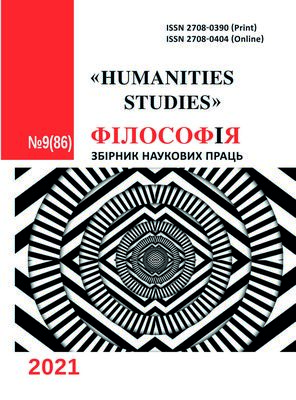Формування концепції спортивного менеджменту у контексті викликів пандемії COVID-19
DOI:
https://doi.org/10.26661/hst-2021-9-86-08Ключові слова:
спортивний менеджмент, пандемія COVID-19, інноваційна спортивна прарадигма, здоров'я нації, цифрові технологіїАнотація
Актуальність наукового дослідження спортивного менеджменту зумовлена як недостатньою теоретичною розробленістю даної теми, пов'язаної зі зростанням її праксеологічного значення у ситуації пандемії COVID-19, так і визначенням векторів змін у спортивному розвитку, включаючи розвиток масового та олімпійського спорту. У статті досліджено умови формування спортивного менеджменту в умовах пандемії COVID-19, які суттєво актуалізують спортивний розвиток, самореалізацію людини у спорті, формування освітньої політики держави, націленої на розвиток спорту та спортивних досягнень на всіх рівнях, формування концепції спортивного інноваційного менеджменту в сучасному світі та Україні . Як показує аналіз, реанімація спорту та спортивних досягнень, використання його потенціалу безпосередньо залежить від рівня управління спортивними процесами. Ціль дослідження: формування концепції спортивного менеджменту в контексті викликів пандемії COVID-19. Для досягнення мети поставлено такі завдання: 1) проаналізувати спортивний менеджмент як пріоритетний напрямок діяльності держави у контексті викликів пандемії COVID-19; 2) з'ясувати предмет, об'єкт та принципи спортивного менеджменту у контексті викликів пандемії COVID-19; 3) сформувати концепцію інноваційного спортивного менеджменту в Україні у контексті викликів пандемії COVID-19. Для досягнення мети виявлено теоретико-методологічні засади спортивного розвитку у контексті сучасної спортивної парадигми, вивчено зарубіжний досвід спортивного розвитку у розвинених країнах Заходу в Україні в умовах COVID-19. В основі спортивного мкенеджменту – вирішення нагальних проблем спортивного соціуму, що обумовлюється необхідністю вивчення аксіологічних, онтологічних, антропологічних, метафізичних основ спортивного розвитку, покращення спортивного розвитку кожної особи. Формування концепції спортивного менеджменту в умовах пандемії COVID-19 включає аналіз проблем, пов'язаних з погіршенням стану здоров'я населення, що вимагає формування концецпії спортивного менеджменту
Посилання
Voronkova, Valentina, Kivlyuk, Olga, Romanenko, Tatyana, Rizhova, Irina & Andryukaitene, Regina (2017). Conceptualization of smart-society and smart-technologies in the context of the modern civilization development. Journal Science and Practice: Current Issues and Perspectives International Scientific-Practical Conference. 249-257.
Bilohur, Vlada, Andriukaitiene, Regina & Makieshyna, Juliia (2021). Educational policy in sports field during the COVID-19 pandemic: challenges, threats, development trends. Humanities Studies: Collection of Scientific Papers. Zaporozhye: Zaporozhye National University. 7 (84). 65-74.
Bilohur, Vlada & Andriukaitiene, Regina (2020). Sports culture as a means of improving ports personal integrity: philosophic cultural and anthropologic analysis. Humanities Studies. Zaporozhye: Zaporozhye National University. 6 (83). 136-152.
Bilohur, Vlada & Andriukaitiene, Regina (2020). Theoretical methodological sports reflection as a human dimension sports activity and possibilities area of its humanization in the society. Humanities Studies. Zaporozhye: Zaporozhye National University. 5 (82). 132-146.
Lekavičius, Tomas (2020). Human resource management in sport organization from the point of view of employees. Humanities Studies. Zaporozhye: Zaporozhye National University. 5 (82). 147-159.
Skirmantas, Sinkevičius & Svagzdiene, Biruta (2020). Assessment of sports principle sustainability organized in Lithuania. Humanities Studies. Zaporozhye: Zaporozhye National University. 5 (82). 160-171.
Bilohur, Vlada & Andriukaitiene, Regina (2020). Sports philosophy as a substance basis for personality and expression development of the general essence in competition. Humanities Studies. Zaporozhye: Zaporozhye National University. 4 (81). 145-164.
Akranglyte, Gintare, Andriukaitienė, Regina & Bilohur, Vlada (2019). Formation of character and sportsman image as a competitive advantage in mass media (continuation of the article №2, 2019). Humanities Studies. Zaporozhye: Zaporozhye National University. 3 (80). 92-111.
Svagzdiene, Biruta & Pupkis Algirdas, (2020). organizing physical activity problematic events in the work of leisure time organisers: why and how? Humanities Studies. Zaporozhye: Zaporozhye National University. 3 (80). 112-121.
Akranglyte, Gintare, Andriukaitienė, Regina & Bilohur, Vlada. (2019). Formation of character and sportsman image as a competitive advantage in mass media. Zaporozhye: Zaporozhye National University. 2 (79). 115-136.
Šarūnas, Bičiušas (2019). Factors for the preparation of high master athletes in sports organization staff context competences. Humanities Studies. Zaporozhye: Zaporozhye National University. 2 (79). 137-152.
Bilohur, Vlada (2019). Formation of innovative sports management concept in Ukraine. Humanities Studies. Zaporozhye: Zaporozhye National University. 1 (78). 27-38.
Jaruševičienе, Lina (2019). Development of cultural and sports activities in Lithuanian villages. Humanities Studies. Zaporozhye: Zaporozhye National University. 1 (78). 39-49.
Melnik, Victoria (2019). Agile-management 3.0 concept as technological progress development factor in the digital society. Humanities Studies. Zaporozhye: Zaporozhye National University. 1 (78). 130-139.
Nesterenko, Olena & Oleksenko, Roman (2020). Social philosophical reflection of an individual legal education philosophy as the basis for the democratic society functioning. Humanities Studies. Zaporozhye: Zaporozhye National University. 4 (81). 165-181.
Nikitenko, V. (2019). Digitalization impact on value orientations changes in the modern digital society. Humanities Studies. Zaporozhye: Zaporozhye National University. 2 (79). 80-94.
Nikitenko, Vìtalina (2020). Evolution and further development in real world in the conditions of technological changes in the context of socio-philosophical discourse. Humanities Studies. Zaporozhye: Zaporozhye National University. 4 (81). 60-73.
Nikitenko, Vitalina, Andriukaitiene, Regina & Punchenko, Oleg (2019). Sustainable digital economical conceptual formation: challenges, threats, priorities. Zaporozhye: Zaporozhye National University. 1 (78). 140-153.
Rizhova, I. (2010). Needs’ and interests’ in design work formation. Humanitarian notice of Zaporozhye State Engineering Academy. 42. 247-258.
Cherep, Alla, Voronkova, Valentyna, Muts, Luai & Fursìn, Alexander (2019). Information and innovation technologies as a improving the efficiency factor of digital economy and business in the Globalization 4.0. Humanities Studies. 1(78). 170-181.
##submission.downloads##
Опубліковано
Номер
Розділ
Ліцензія
Авторське право (c) 2022 Vlada Bilohur, Regina Andriukaitiene

Ця робота ліцензується відповідно до Creative Commons Attribution 4.0 International License.
Всі права на опубліковані статті належать авторам відповідно ліцензії Creative Commons CC BY. При цьому авторами надається дозвіл на публікації статті в журналі "Humanities Studies". Автори мають право використовувати матеріал статті в будь-якому форматі на основі неексклюзивного поширення роботи за умов посилання на першоджерело, тобто публікацію в журналі "Humanities Studies".

